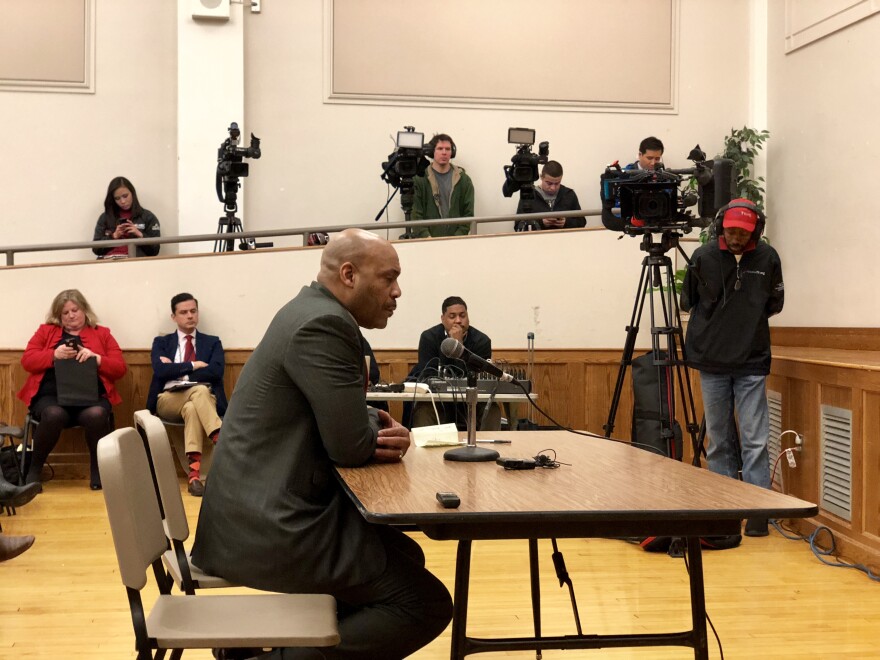The Hartford school board voted Tuesday night to close two neighborhood schools this year, endorsing the first wave of a plan to downsize a school system with high needs and declining enrollment.
More than a decade after reform efforts began, Superintendent Leslie Torres-Rodriguez says Hartford has too many schools — and not enough money to support them in the cash-strapped capital city. Her consolidation plan calls for closing, relocating or merging at least a dozen schools over the next three years, and spreading more resources to the ones that are left.
Board members, some with tears in their eyes, said they believed their vote was a step toward fixing inequities in the system — where neighborhood schools, mostly populated with students of color and the impoverished, lag behind gleaming magnet schools that draw a mix of suburban and Hartford students.
Mayor Luke Bronin praised the board’s decision in a statement late Tuesday, calling the plan “a difficult but necessary reorganization of the Hartford Public Schools.”
Leading up to the unanimous vote, parents and employees from the two schools that will close this summer — Batchelder in the South End and Simpson-Waverly in north Hartford — had pleaded with the board to spare them and reconsider the options. The schools serve pre-kindergarten to eighth grade and have been around for generations. Students here will be dispersed to other schools.
“Simpson-Waverly sits tucked in Hartford’s North End, a little-known secret of greatness … . It is a powerhouse, and if you close it, that’s going to be detrimental to the students and the families,” said Latoya Martindale, a Simpson-Waverly teacher and mother of five. She worried that the school site would become blighted.
“We already are paying for the sins of the fathers for far too long,” Martindale said. “Who will want to come to north Hartford when all they see is vacant properties and barbed wire? That’s my neighborhood, so it’s personal.”

Labor unions that represent Hartford teachers and paraprofessionals also criticized the closures, arguing that it would perpetuate inequality.
“The most disturbing … and challenging part of this plan is that it creates holes in our community, holes in our neighborhoods,” said state Rep. Joshua Hall of Hartford, a vice president with the Hartford Federation of Teachers. “There are some who are celebrating this plan, and they are welcome to do that. I question why when it has generated so much pain, anger and trauma.”
Board members and other residents who spoke Tuesday, including a crew of parents from the Hartford Parent Leadership Coalition advocacy group, said their disappointment over chronically low test scores and lost opportunities is what led them to support the plan — believing it would shake up the status quo and free up millions that could be used toward the arts, sports, advanced classes, and teacher development.
In endorsing the proposal, several speakers also expressed their faith in Torres-Rodriguez, a Hartford public schools graduate who ascended to the top job last year after a stint as interim schools chief.
Hartford state Sen. Douglas McCrory put it this way: There is no “political will” among his colleagues at the state to do more for the education of city children.
“You’re challenged to do what we don’t do,” McCrory told the board. “So again, I don’t envy you … . But you have to, have to be ready for change, and we have to support someone who understands our children, who understands these communities and who wants the best for our families.”

Board member Kim Oliver recalled how she graduated from Weaver High School and went on to Yale University, prepared for the rigor of the Ivy League. But the education she experienced more than two decades ago in Hartford public schools, she said, has faded. Test scores at the city’s non-magnet schools are “unacceptable,” Oliver said.
A parent advocate who spoke earlier, Milagros Vega, had lamented in Spanish that she knew of high school students struggling to read.
“I live in the community I grew up in — I’ve watched it consistently be depressed,” said Oliver, who is the city’s director of families, children, youth and recreation. “And let me tell you, a teacher can change your life. A school can change your life. And we need to change more lives.”
Tuesday’s vote also brings an official end to Clark Elementary School, which had been closed since 2015 after toxic chemicals called PCBs were discovered in the North End school.
Another Hartford school that will close next year, Capital Community College Magnet Academy, is being phased out because of its small size — currently, fewer than 40 students in 11th and 12th grades. That magnet school opened in 2014 under the Sheff v. O’Neill desegregation pact, but was unable to attract enough white and Asian students from the suburbs to meet integration goals.
This report is part of the public radio collaborative Sharing America, covering the intersection of race, identity and culture. The initiative is funded by the Corporation for Public Broadcasting and includes reporters in Hartford, Conn., Kansas City and St. Louis, Mo., and Portland, Ore.













